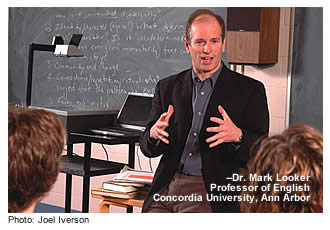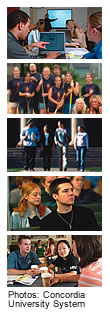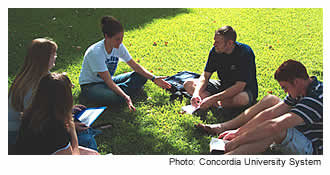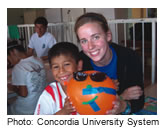by Roland Lovstad
Dr. Gerald B. Kieschnick, president of The Lutheran Church—Missouri Synod, refers to them as “crown jewels.” And like jewels, the system of Concordia universities and colleges reveals many facets that invite examining, exhibiting, and, most of all, using with pride. Each institution strives to offer education that emphasizes Christian faith, quality instruction, caring and committed faculty, and Christian service.
“In The Lutheran Church—Missouri Synod, education has always been a very high priority,” says Dr. Elmer Gooding, chairman of the Board for University Education, which oversees the 10 colleges and universities known as the Concordia University System. “I really believe that the institutions are doing a wonderful job of educating not only church workers—future pastors and other professional workers—but also educating lay people who will serve in leadership positions in their churches and in their communities.”
The concept of vocation underlies the “Lutheran difference,” according to Dr. Kurt Krueger, executive director of the Board for University Education and president of the Concordia University System. “We believe that a person can serve God in any legitimate worthwhile calling. When students come to a Concordia, we affirm their vocational choices, because we know that if a student has a servant heart that they take into the various professions and into the public square, they will be serving God.”
Faculty and administrators agree: There is a “difference” in the educational experience at Concordia colleges and universities. The question, “What is a Lutheran education?” was posed to four faculty and administrators with extensive experience in higher education. Their comments yield thoughtful and heartfelt reflections of the many facets of the Concordia University System.
A Foundation of Faith
“Lutheran education is about keeping the difficult balance between divine wisdom—which we as fallen human beings so desperately need—and the human wisdom that we passionately seek,” observes Dr. Mark Looker, professor of English at Concordia University, Ann Arbor, Mich., where he has taught since 1975.

As an educator, he believes Christian faith is a foundation for educational classes and experiences that allow students to learn to interpret and understand the world about them. “I see my goal as trying to wake up my students and not let them sleepwalk through the rest of their lives. It is giving them things they’ve never thought about before and then trying to pull back and put those discoveries into the context of their faith as Christians.”
At Concordia University Chicago (River Forest), Dr. Manfred Boos says he would share his faith in his mathematics classes. He says he would say something like, “Could this have just happened randomly, or could this have been created this way so we could find it out?”
“I’ve never had a student say, ‘Oh, that’s ridiculous!’” Boos says. “I think our faculty is pretty good at bringing their faith life into who they are as people and how they view their discipline.” Boos has taught at the university since 1980 and before that at Concordia College, Bronxville, N.Y.
Now vice president for academics, Boos says theology courses are required for all students. That provides opportunity to discuss Lutheran theology with people who aren’t Lutheran and the opportunity to learn from others. Chapel is held every day, Boos adds, providing a high point when students and faculty can worship together.
“Christian values are what really generates and motivates the operation of this institution,” observes Dr. McNair Ramsey, interim president at Concordia College in Selma, Ala. “Without that, we don’t feel we are doing anything, and certainly we are not serving our church if we don’t highlight these Christian values as the premier function of our institution.” Ramsey has taught at the college since 1980.
Ramsey adds that faculty and staff are encouraged to open with prayers and devotions before their classes. Devotions are offered in the dormitories, chapel is held three times a week, and faculty meetings open with prayer.
Quality Education
Boos says the Chicago faculty has designed a basic curriculum that emphasizes critical thinking. “We emphasize the questioning of information—does this make sense, how does this fit, can I find justification for this point of view?” That, he says, contrasts with “Okay, kids, I’m going to open your head and dump it in; memorize it.
“The key is communication skills, writing skills, critical-thinking skills that we are trying to develop through courses in the basic curriculum,” Boos adds.
Looker emphasizes, “I think everybody in the Concordia system would agree that we have to—just have to—be every bit as good on the academic level as you would find at any college or university.” Simply giving more “spiritual stuff” won’t make up for second-rate academics, he says.
 Dr. Robert Holst, president of Concordia University, St. Paul, Minn., since 1991, believes that today’s college students—the Millennial Generation—are realistic and seek change that addresses problems in society and the world. Their attitude poses a challenge to the tendency of universities to be places of intellect and idealism.
Dr. Robert Holst, president of Concordia University, St. Paul, Minn., since 1991, believes that today’s college students—the Millennial Generation—are realistic and seek change that addresses problems in society and the world. Their attitude poses a challenge to the tendency of universities to be places of intellect and idealism.
“This generation says, ‘Don’t give us ideas and idealism,’” Holst explains. “They learn from practical experience. They ask what we are going to do about pollution or the AIDS epidemic, for example. So, experiential education is becoming much more important. I think it’s great, because Jesus wasn’t out there just talking. He was touching people. He was healing people. He was criticizing people.”
Concordia Chicago requires all freshmen to take a “Freedom and Responsibility” course. Instructors seek to guide students in understanding the independence that comes in the transition from high school to college life. Boos says every instructor integrated service activities into the course last fall. The students worked with projects that varied from homeless shelters to agencies that serve the developmentally disabled. Those experiences build one-on-one interaction between faculty and students, according to Boos. “It is the commitment made by faculty to share who they are in their faith and religious issues, theology and service, and concern and care,” he says.
The university also requires graduating students to take a “Values and Virtues” course that challenges them to explore what they have learned and how they will apply both academic and spiritual learning to issues in the world around them.
Small size is an advantage at Concordia, Selma, which Ramsey describes as “a Christian environment” where faculty make time to give personal attention to students, especially those who lack some skills. “This institution takes those individuals and molds them under the Christian philosophy into productive young men and productive young ladies who are able to go out and serve others in their own personal communities and in the church community.”
Committed Faculty
Ramsey also speaks of faculty giving personal attention to students. “In fact, faculty will go where the students are. That means going into the dormitories or seeing them at a basketball games, on the college grounds, or meeting with them in the cafeteria. They will go where they are and not just sit in their offices and expect students are going to come to them, because, in most cases, they will not.”
As president at Concordia, St. Paul, Holst interviews every prospective faculty member. While search committees evaluate their capabilities in the discipline, Holst looks for theological understanding and outlines the university’s expectations.
“During the interview, I say we expect them to be experts in their fields and stay experts in their fields,” Holst comments. “Second, we expect them to love teaching and to enjoy the give and take of the classroom. Third, they should be collegial—that is, they should understand the importance of working well with colleagues, staff, and students.” Those expectations are also part of a review process that incorporates evaluation by both students and other faculty, he adds.
The university strives to have a Lutheran faculty, Holst says. However, even if men and women were confirmed as Lutherans, they may not have a thorough understanding of the history of the Synod. So every new faculty member— Lutheran or not—attends a Lutheran identity seminar.
“It’s partly theology—for example, an introduction to the Book of Concord and documents such as those from the Commission on Theology and Church Relations,” he says. “Then the district president, members of the board of regents, I as president, and other people come in to help them understand that being a Lutheran today is part of a dynamic faith, not simply awareness of Martin Luther once-upon-a-time.”
Holst tells prospective faculty they will have more academic freedom at Concordia. “Here we not only permit you to share your values, we expect you to.”
A similar thought is expressed by Looker in Ann Arbor: “While it would seem paradoxical to people outside of the Christian world or the Lutheran tradition, our grounding in the Word gives us a certain kind of freedom to discuss issues from different perspectives. I think of it as freeing rather than constricting.”
As chief academic administrator at Concordia, Chicago, Boos participates in interviews and asks prospective faculty for their thoughts about the importance of the university being a faith-based institution. Their faith life and attitude about service to the Lord are just as important as their academic credentials, he says.

“We sometimes forget the importance of setting an example,” Boos adds. “As an administrator I also participate in the worship life of the university. Students and faculty see that; I think it sends a message.”
As a professor at Concordia, Ann Arbor, Looker says he starts each course with the idea that every student is going to love English literature the way he loves it. “Faculty come to these places because they care about their subject matter, and they want students to care and to catch some of that passion. They want students to be aware of the world God has created, and in which He has placed us.”
Christian Service
Looker adds that the university tries to build events and activities into every program so students get off the campus, frequently with churches or service agencies. “We make possible other optional service activities … and in some ways I’m most pleased when students themselves come up with service projects that faculty and staff haven’t considered.”
In Chicago, the faculty uses the term “academic service learning.” Boos says the purpose is to connect the classroom with services in the community. For example, Spanish students may use their language skills to help parents communicate with teachers at Lutheran and public schools. Last year, a business professor had his class provide free income-tax advice.
Ramsey cites the campus Rotaract Club, connected with Rotary Clubs International, which draws students into community service. Club members sponsor activities at a nearby children’s home, as well as gather funds and supplies for children in other countries.
Noting that his Concordia campus is in the midst of diverse and growing ethnic communities in the Twin Cities, Holst offers a perspective that coincides with his conviction that education is also mission.
He says the university works hard to recruit a diverse student body, adding, “Unless you are engaged with people of different cultures, your education is going to be irrelevant, or incomplete. In Minnesota, you better know something about the Hmong and the African immigrants.”
For example, the university’s Somali Adult Literacy Training (SALT) program helps African immigrants to read and write English. As they teach, students and faculty use Christian materials. Although the immigrants are Muslim, they come because they want to get ahead in life and they know English is important, Holst says. Another program focuses on helping students hone their leadership skills and academic abilities with mentoring from a faculty member and students.
“I think Lutheran education takes seriously the secular world. It takes seriously its theological strength and wants to share both its knowledge and faith with other people,” Holst says.
Thanks to the Church
“I thank the members of our Synod for their continued support of our students and our colleges and universities,” Krueger says. “I remind them of how important these institutions are to the church in terms of producing professional workers and in educating faithful lay people who will be leaders in our congregations throughout the Synod.”
From a Student’s Perspective
 I love all of the things that Concordia offers, and I think every Concordia benefits by their partnership with the others. I think Concordia’s Lutheran heritage plays into our campus in just the right dose. In classes and around campus, things are filtered through the Lutheran worldview, and our Lutheran foundation is obvious in things like chapel and theology classes.
I love all of the things that Concordia offers, and I think every Concordia benefits by their partnership with the others. I think Concordia’s Lutheran heritage plays into our campus in just the right dose. In classes and around campus, things are filtered through the Lutheran worldview, and our Lutheran foundation is obvious in things like chapel and theology classes.
—Kelly Warneke
DCE and English Major
Concordia University, Irvine
For a web-exclusive profile of Concordia, Irvine, student Kelly Warneke, as well comments by Concordia, Portland, graduate Lynn James about the benefits of a Concordia education, click here.
Learn More About the Concordias
For a “viewbook” showing all 10 Concordias, contact the Concordia University System by calling (800) 248-1930, ext. 1252 or visit www.lcms.org on the Web.
To contact individual campuses, use the following:
Concordia University, Ann Arbor, Mich.
(1,075 students), (888) 282-2338, www.cuaa.edu
Concordia University Texas, Austin
(1,835 students), (800) 865-4282, www.concordia.edu
Concordia College—New York, Bronxville
(744 students), (800) YES-COLLege (937-2655),
www.concordia-ny.edu
Concordia University, Irvine, Calif. (2,392 students),
(800) 229-1200, www.cui.edu
Concordia University Wisconsin, Mequon
(5,933 students), (888) 628-9472, www.cuw.edu
Concordia University—Portland, Ore. (1,644 students),
(800) 321-9371, www.cu-portland.edu
Concordia University Chicago, River Forest, Ill.
(4,126 students), (877) 282-4422, www.cuchicago.edu
Concordia University, St. Paul, Minn. (2,260 students),
(800) 333-4705, www.csp.edu
Concordia College, Selma, Ala. (551 students),
(334) 874-5700, www.concordiaselma.edu
Concordia University Nebraska, Seward
(1,279 students), (800) 535-5494, www.cune.edu
Enrollment figures are fall 2007 headcounts.





